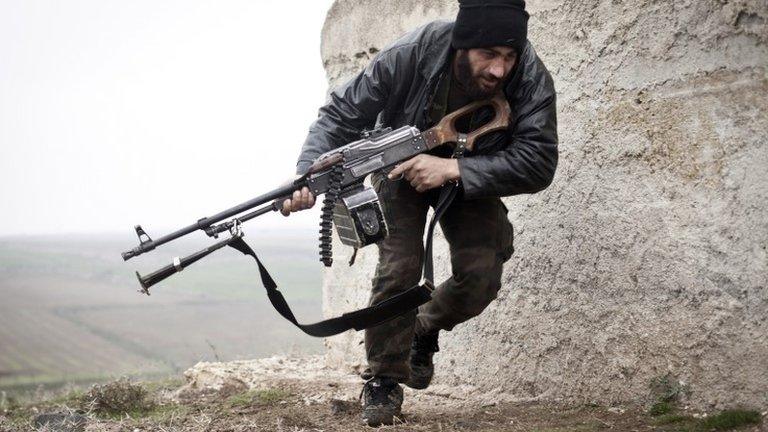Arming Syrian rebels: Where the US went wrong
- Published
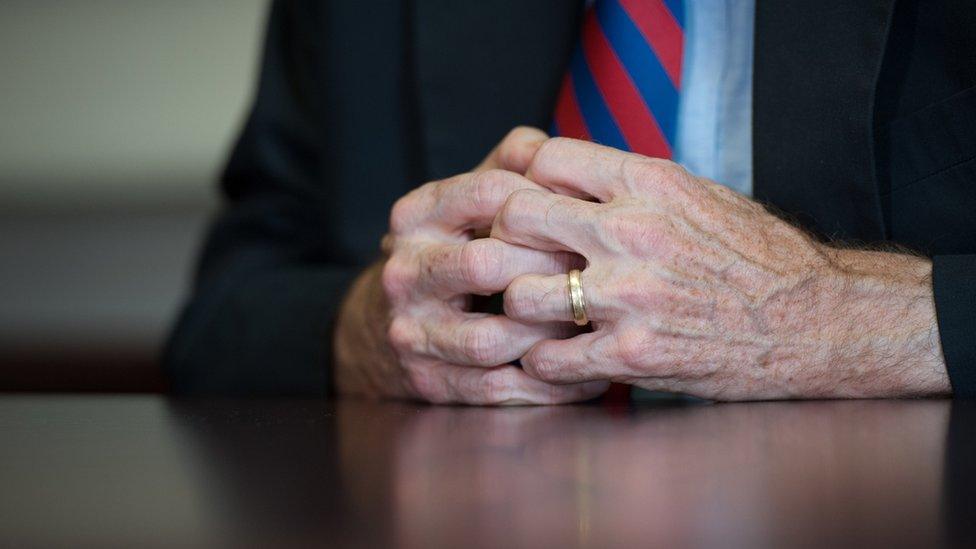
Robert Ford, the former US ambassador to Syria, became upset when talking about his efforts in Washington to convince officials to provide more support for the Syrian opposition
US President Barack Obama never seemed to want a train-and-equip programme for Syrian rebels. Now, government officials admit that the programme is pretty much over. Here's what happened behind the scenes at the White House.
After the uprising against President Bashar al-Assad in 2011, rooting for the rebels was, for many in the West, synonymous with rooting for democracy and freedom.
In the US, White House officials offered the rebels humanitarian aid and some military gear. But they argued over whether they should provide heavy weapons and help in a more serious way.
The philosophical discussion at the White House was heated and fierce, leading to stalemate, not resolution.
For years Obama and his deputies refused to say categorically: we're not doing this. Instead a decision was postponed.
Four years later, the result is a splintered Syrian opposition, the growth of the Islamic State group and a humanitarian disaster stretching across Europe.
Last year, in a move that was more symbolic than serious, Obama asked Congress for money to fund a programme allowing US personnel to teach rebels marksmanship, navigation and other skills.
The goal was to train about 15,000 rebels in Jordan and other countries so they could return to Syria and fight. However, US defence officials admitted last month that only four or five of the recruits in the programme had actually returned to the battle.
Speaking recently at the White House, Obama looked frustrated as he described "failures" in the US train-and-equip programme.
On Friday US officials told reporters the programme was being modified.
"We're going to take a sort of operational pause," said Christine Wormuth, an undersecretary of defence. Rebel leaders will now receive basic equipment packages, she explained, but training for the fighters has been stopped.
The story of this disastrous programme dates back to the early days of the uprising in the Middle East. Robert Ford, the former US ambassador to Syria, had a front-row seat to the drama.
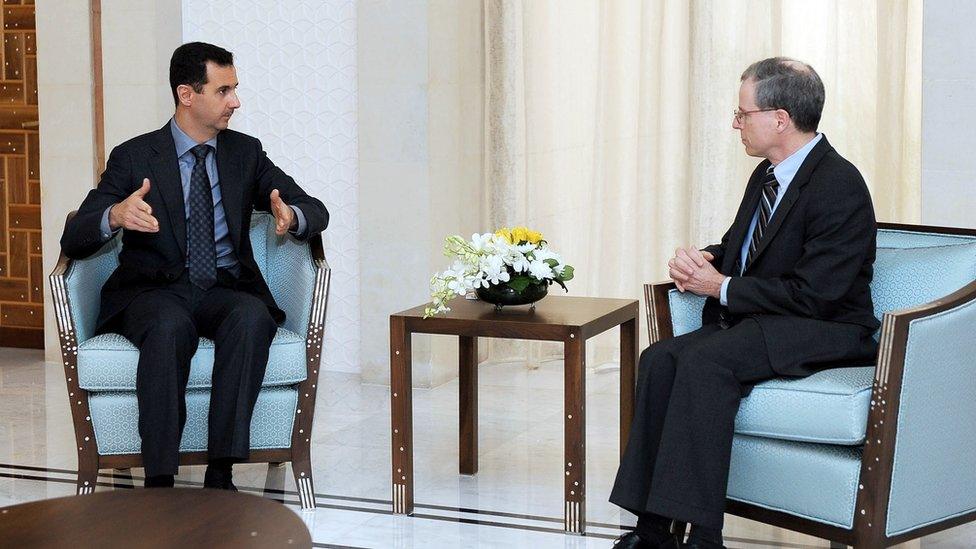
Amabassador Ford with Syrian President Bashar al-Assad in 2011
In early 2011 he met with Assad. Governments were being overthrown in Tunisia and Egypt, but things were still quiet in Syria. They discussed diplomacy in a polite manner. Then Ford asked about human rights. Assad "hit red real quick," Ford said.
"He raised his voice, and it was very clipped, short," Ford said, twisting his face and karate-chopping a desk.
After serving as ambassador to Algeria and working as a diplomat in the Middle East, Ford was the State Department's go-to Syria expert for years.
He was faced with the challenges of managing the department's portfolio for Syria, a lovely country with olive groves and rolling plains that's "not of any particular strategic interest to anybody who doesn't live there," as Anthony Cordesman, an analyst at the Center for Strategic and International Studies, said.
Even worse, Ford had taken on a seemingly hopeless task - arming the opposition in Syria with US weapons.
Because of the uprising, Syria was in the news. But despite the changes within the country, Syria still wasn't vital to the strategic interests of the US.For that reason it remained a low priority for administration officials.
When the Assad regime started to falter in 2012, Ford believed the US should get involved in the conflict by supporting the rebels. Otherwise Syria could slide into anarchy and become "another Somalia/Yemen", he said, using state department code for Failed State.
Virtually everyone in the US, including Obama, wanted to support the opposition in Syria. But the question was whether the US should send Stinger missiles and rocket-propelled grenades, or offer moral support and humanitarian aid and stay out of the conflict.
Ford told administration officials years ago they should arm the rebels. If the US doesn't help, he said at the time, extremists will give them money and lure them into their organisations.
Those who supported his approach, the Arms for Rebels group, included then-CIA Director David Petraeus, then-Secretary of State Hillary Clinton and most of the foreign-policy establishment in Washington, both Democrat and Republican.
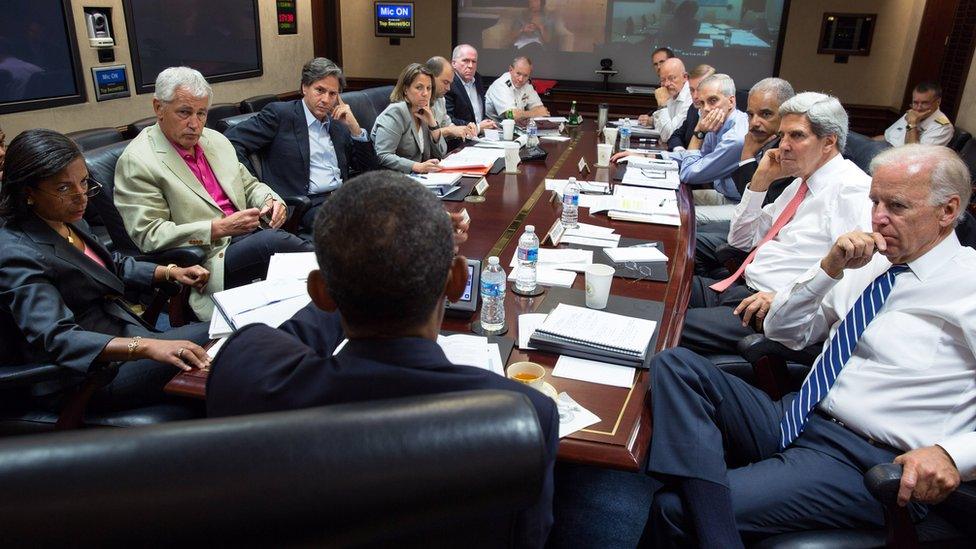
Obama and his national security team discussing Syria strategy in 2013. Many in the room were reluctant to arm rebels.
On the other side of this issue at the time were Obama, top members of the national security staff and most of America.
For years, according to a CBS News poll, external, Americans were opposed to the idea of sending ground troops into Syria to fight the Islamic State (IS) group.
The White House officials were wary of military involvement in overseas conflicts, and they saw the Arms for Rebels idea as a step towards a full-scale, decades-long intervention in Syria.
"Originally the argument was, 'We don't know them very well'," Ford recalled. "When we got to know them better, it was: 'They don't have very good backgrounds'."
Most of the rebels, he said, weren't "ideologically pure", not in the way US officials wanted. "In wars like that, there is no black and white," he said.
Rather than providing weapons, US officials provided food, medical kits and non-lethal military gear.
Obama's national-security advisors argued that Syria was at least relatively stable with Assad in power. These advisors, as US officials who supported the programme told me, were presenting a false choice: Either Assad stays or Syria will be overrun with terrorists.
In the end, said those who supported the programme, Syria got the worst of both outcomes.
They believe Obama's advisors should shoulder the blame for the failure of the programme and also for the failure of the US to help in Syria.
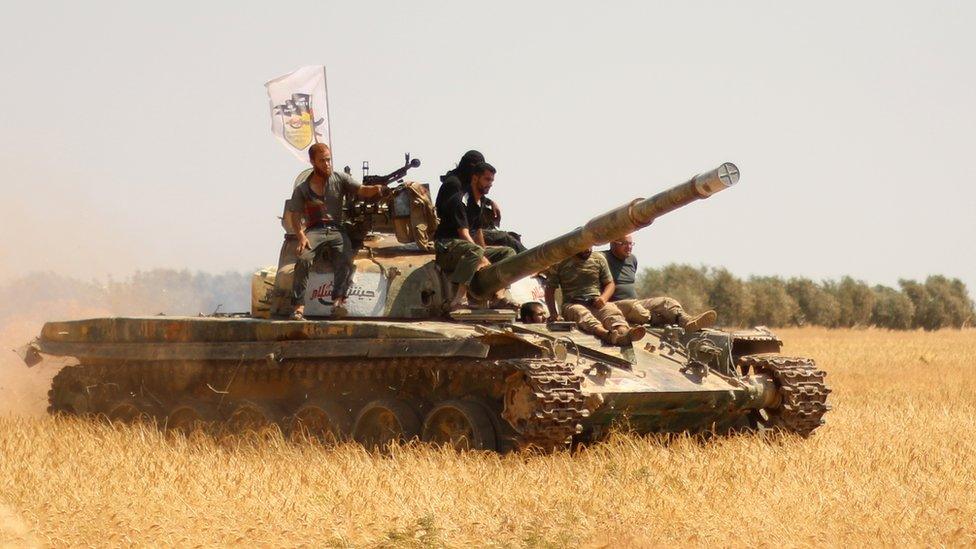
Rebel forces from Jaysh al-Islam, or the Army of Islam, hold position near the frontline outside of Aleppo in August.
With more than 200,000 dead and four million refugees, the Syria crisis has unfolded over a period of several years while Ford and his colleagues watched in horror.
"It's not a problem of information," said Derek Chollet, who worked on Syria issues as assistant defence secretary. "It's not, 'Boy, if we had just known more.' There was never that."
Ford's career as a diplomat is now over. I spoke with him at the Middle East Institute in Washington, where he was working in a borrowed office. The desk was empty except for a black ballpoint pen.
While serving as ambassador to Syria from 2010 to 2014, he became familiar with the opposition in a way few Americans were.
"He knew all these brigades, and he knew their strengths and weaknesses," New America Foundation's Barak Barfi told me, speaking on the phone from Syria.
Michael Posner, a former assistant secretary of state, said Ford made an important contribution to the White House debate about Syria.
"Usually when things get too complicated, it's: 'Oh, we can't have a point of view'." said Posner. "But he did have a point of view. He was a very principled, courageous diplomat who did a lot of good."
People in the Syrian-American community admired Ford's efforts and looked at Obama in disbelief. "You can't stop barrel bombs with fruit baskets," said the Syrian American Council's Mohammed Ghanem.
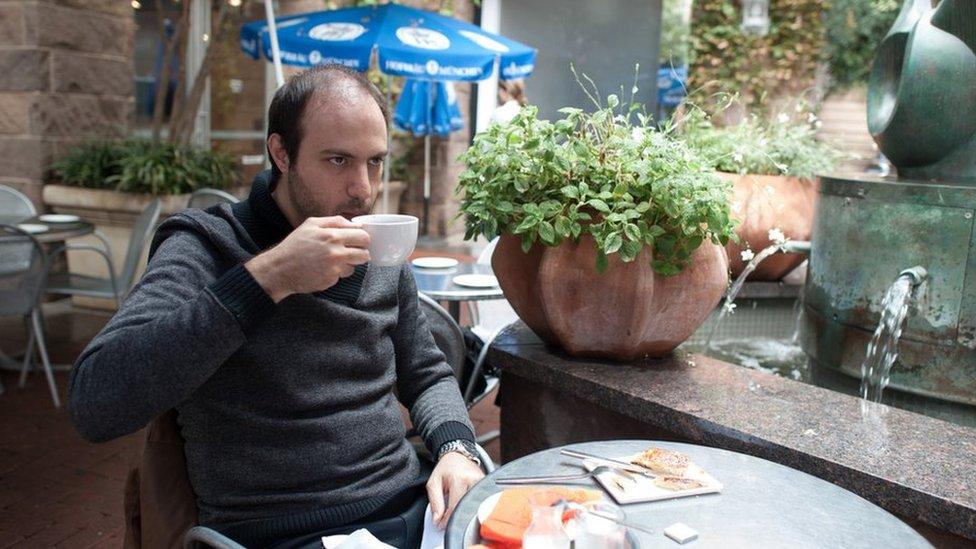
When the Syrian American Council's Mohammed Ghanem gets homesick, he likes to spend time at a Georgetown café that reminds him of Damascus. Photo by Colm O'Molloy for BBC News.
People in the intelligence community said the time to arm the rebels was 2012. The opposition was turning into a military force and hadn't yet been overrun by al-Qaeda-linked fighters and militants.
Not helping the rebels had consequences, Ford said.
Early support came in the form of "soon-to-expire MREs", or Meals Ready to Eat, "repurposed from Afghanistan and Iraq", says one former opposition member.
The White House officials didn't want to provide weapons in part because they were afraid they'd end up in the wrong hands. Rebels later admitted some weapons ended up with an al-Qaeda-affiliated group.
The CIA gave some weapons and supplies to the rebels, though not many.
"Fifteen bullets a month," said Ghanem. "That was actually mind-blowing."
He recalled meeting a CIA contractor who tasked with helping the rebels who had quit, saying: "They're asking us to perform miracles, but they're giving us nothing."
Doing even small things was hard since the process in Washington was "completely choked", said a retired US Army Lt General, Michael Flynn, the former Director of the Defense Intelligence Agency.
"It was always a 'mother-may-I'," he said. "And the 'mother-may-I' would take a long time."
Military officials were trying to explain to officials at the White House what they needed to help the rebels. The requests were vetted by people from the White House and federal agencies such as the state department.
While people were arguing over Syria in Washington, Ford was in Damascus, telling rebel fighters Americans were on their side. Things were promised but never arrived, though, making it hard for him to develop a relationship with them.
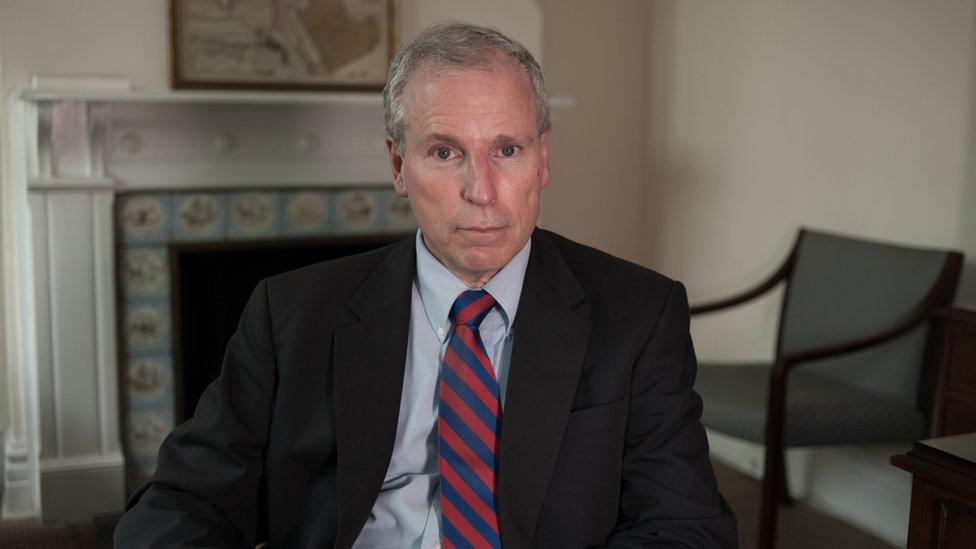
Robert Ford fought to arm the rebels in Syria. Photo by Colm O'Molloy for BBC News
He recalled when two Americans, photographer Matthew Schrier and journalist Theo Padnos were held by a militant organisation, Nusra Front, in Aleppo. One morning in July 2013 Schrier escaped through a small window. Padnos didn't.
Schrier told US officials about the building and its location. The officials asked one of the opposition leaders to go to the building and wondered what would happen.
"It's not like he owed me anything," Ford said. He never found out if the commander actually looked for Padnos.
Left alone in the cell, Padnos was tortured. Thirteen months later, with the help of Qataris and Americans such as David Bradley, chairman of Atlantic Media, Padnos was released.
He has a gentle, trusting manner, and during a visit to Washington he left his unlocked bicycle outside a café and put his mobile on a table. A crumpled, yellow Post-It with his password was stuck to the phone.
He doesn't sound bitter about Ford, the White House officials or the Syrian commander, and he said it hardly mattered what the Americans were doing for the opposition at the time.
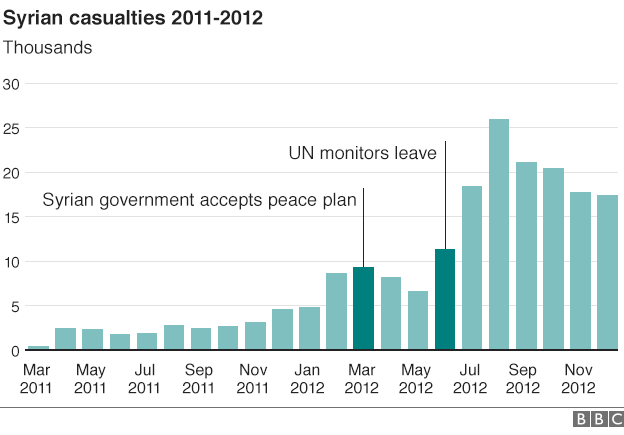
"It's like saying if my grandmother had wheels then she'd be a baby carriage," he said. "If, if, if."
In a broader sense that's true of US support for the Syrian opposition. No one knows what would have happened if Obama had decided to arm the rebels in a serious manner after the uprising had started.
He recently told journalists at the White House that his critics come across as naïve, saying: "'We should have sent more rifles in early and somehow then everything would have been OK'."
In an interview, external last year Obama described the rebels as former doctors, farmers and pharmacists. The president saw the rebels as brave but unpromising. So did many Syrians.
"It was a failed opposition," said Bassam Barabandi, who used to work for the Syrian embassy and is co-founder of People Demand Change, an international development organisation.
"For me when I watched it," he said. "I knew."
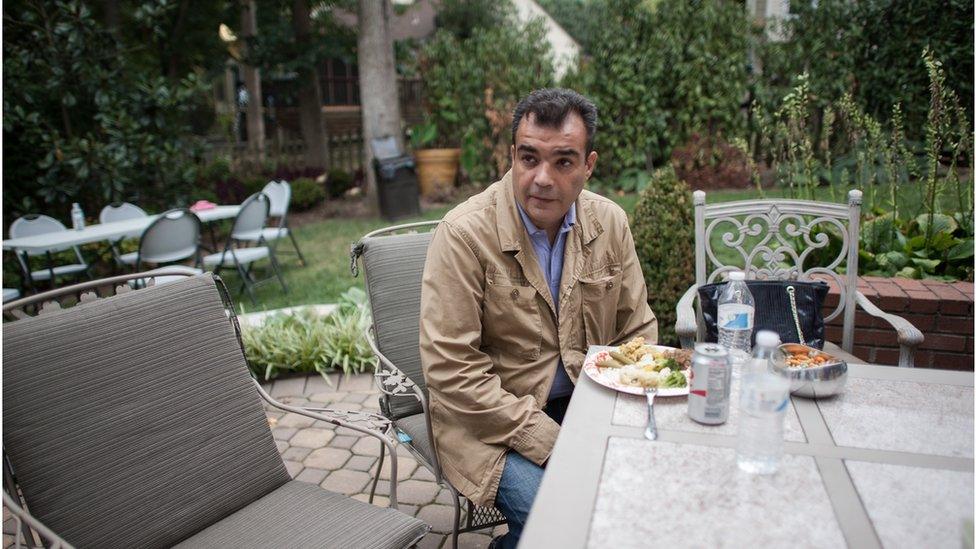
Bassam Barabandi, a former diplomat, left his job at the Syrian embassy in Washington after the uprising. Photo by Colm O'Molloy for BBC News
As we sat at on outdoor cafe, a bee landed on his arm. "Come, friend," he said. "Go away." He lifted his arm and whistled, and the bee floated near his head and disappeared.
With bees and political leaders, Barabandi tries to see the world from their perspective. He admired Ford and others like him but said they were feckless.
"People say we don't understand DC, which is true," Barabandi said. "But they didn't understand Obama, and we've paid a price for it."
For years Obama has been trying to shift the nation's attention away from the Middle East to Asia. He wants to keep America's military role in the world to a minimum.
"The attitude is very condescending. It's: 'Look, Syria is your issue, and we have a lot on our plate'," said Tyler Thompson, of the non-profit United for a Free Syria, describing his meetings with administration officials.
"You never leave the White House with a good feeling."
Obama is impatient with moral arguments. According to people who've discussed policy with him, he swats those notions away and asks: Will it work?
Speaking recently about the train-and-equip programme, Obama said he'd pressed for details about its viability and heard "a bunch of mumbo jumbo".
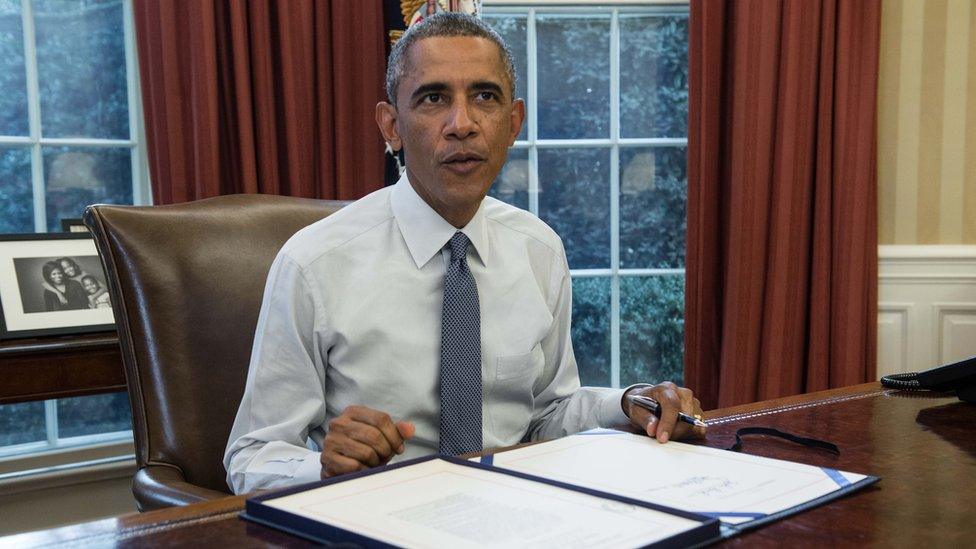
In 2014 Obama signed a spending bill authorising funds to train Syrian rebels
"There's the moral imperative and all that," said one former administration official whose views are closely aligned with the president.
"I just didn't think this train-and-equip programme was going to be able to accomplish anything," he said. He also thought it could pull the US into a long struggle in Syria.
As he talked, I looked at my notebook. I'd written down things people had told me about why the US should send weapons to the Syrian opposition. When I brought these points up, he looked at me as if to say: How can you be so dumb?
The objective of the train-and-equip programme, a "fool's errand", he described it, was to make people feel better about themselves while they watch Syria disintegrate.
He said he was unhappy when Obama acquiesced last year and asked Congress for money to fund the programme. He still couldn't believe he'd lost the argument since, as he said: "The big boss agreed with me."
But after IS beheaded US journalists James Foley and Steven Sotloff, Americans started to re-think what the US military should do.
Within months the majority of Americans supported the notion of providing support and even sending US troops to Syria to fight the militant group.
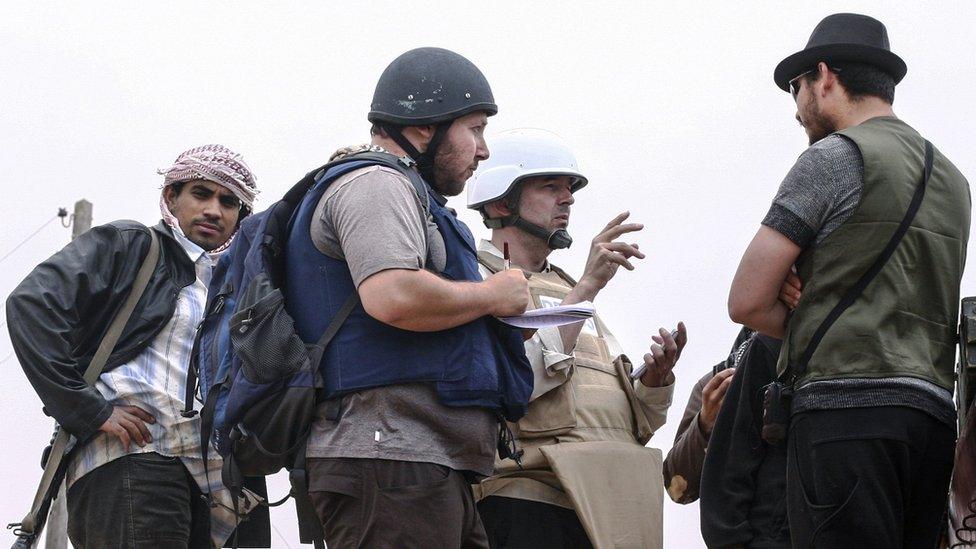
The execution of US journalist Stephen Sotloff (in black helmet) changed American opinion about involvement in Syria
Steven Simon, the former senior director for the Middle East on the US National Security Council, said: "People had this conviction, 'Surely there's something we can do.' There was just one thing on the list that seemed more than just symbolic."
"They put it this way: 'Let's just try it and see what happens'," he said, describing the train-and-equip programme. "It was just kind of thrown out there.
"All you could say with certainty was it would put weapons in the hand of some Syrians."
The train-and-equip programme, which costs $500m (£326m), was designed to help the opposition fight the Islamic State, not Assad.
Last month Capt Chris Connolly, a spokesman for the coalition task force training the rebels, said some may "feel the training may take too long." Still he said morale among trainers and recruits was high.
It's possible to sympathise with people on all sides of the debate at the White House - those who wanted to help the rebels, those who didn't, those in between - and still say Obama made the wrong choice.
At the institute Ford sat in a chair for photographs. He'd taken off his glasses. The lights were bright, and the room was hot. He talked about Syria and the disastrous results of inaction.
"What they saw is a messy civil war, and their basic thrust is, 'We can't steer this'," he said. "But if you don't the situation might actually get worse, and it might bite you in the butt."
He said he didn't want more pictures - then agreed to stay for a moment.
He looked angry and defeated, a man caught in circumstances beyond his control.
Follow @Tara_Mckelvey.
- Published12 November 2014
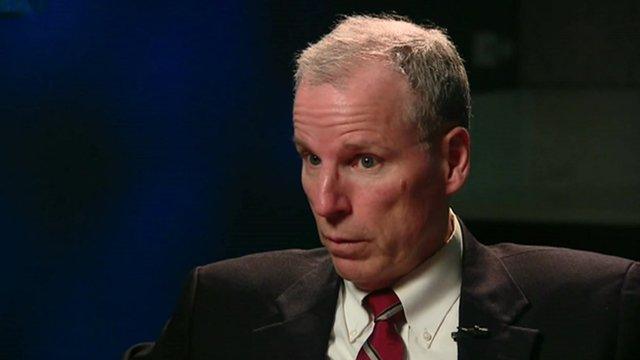
- Published9 May 2013
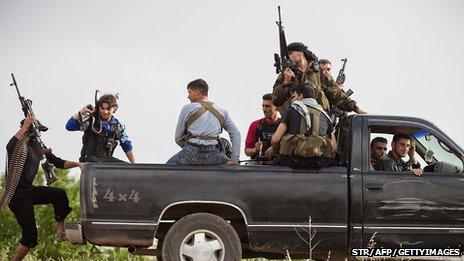
- Published13 December 2013
